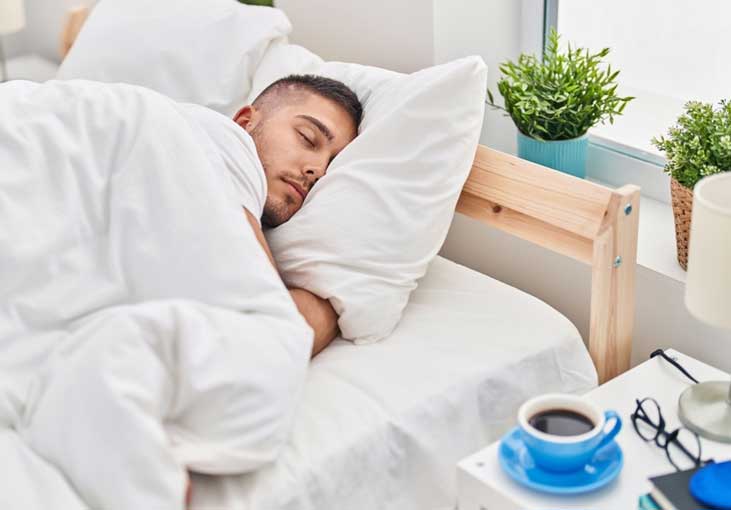How long and how well you sleep have a major impact on your military performance, health, and wellness. It’s easy to know how long you sleep: You track the time you go to bed, estimate how long it takes to fall asleep, and note the time you wake up. Then, it's simple math. But what about sleep quality? Can you measure it? What does sleep quality even mean?
What is sleep quality
Sleep isn’t a single entity. While you sleep, your brain goes through specific activity patterns in 4 stages: Lightest, light, deep, and REM sleep. Sleep isn’t turning off your brain, either. In fact, during REM sleep, your brain shows very high activity levels.
In a sleep laboratory, specialists use a test called polysomnography to measure how much time you spend in each stage of sleep. The targets for quality sleep are 20–25% of total sleep time in deep sleep and 20–25% in REM sleep, which are the 2 most restorative stages of sleep. Simply stated, quality sleep means you cycle through all sleep stages and spend enough time in deep and REM sleep.
Most people don’t get to do a sleep test to learn about the quality of their sleep. But you can use other information to find out how well you sleep.
Signs of good sleep and poor sleep
It's relatively easy to tell when you’re sleeping long- and well enough:
- You fall asleep within 30 minutes of going to bed and sleep through the night. If you wake up to use the bathroom, or for any other reason, you fall back to sleep within 20 minutes.
- You wake up feeling refreshed and energized. It's normal to feel groggy for up to 30 minutes after you get out of bed—and to feel a dip in energy between 1300 and 1500. But other than that, you have enough energy to carry you through the day.
- You don't rely heavily on caffeine to stay alert. It's okay to have caffeine in moderation, but when you get quality sleep, you don't feel like your performance depends on several cups of joe throughout the day.
But it's still possible to meet the recommended 7–9 hours of sleep and not spend enough time in the quality, restorative stages. How can you tell? Some signs you’re probably not getting enough quality sleep include the following:
- You wake up several times during the night. You might also have the feeling your brain didn't fully disconnect and that you continued to process thoughts and feelings from your day.
- You take more than 30 minutes to fall asleep when you first go to bed and more than 20 minutes to go back to sleep when you wake up in the middle of the night.
- You wake up gasping for air or sweating heavily.
- You wake feeling tired and ready to go back to sleep. During the day, you have trouble staying alert, focused, and able to remember things.
- You have a hard time regulating your emotions.
- You rely on high caffeine intake to get through your day.
- You have microsleep episodes—short periods of sleep that last a few seconds—during the day.
- You feel more hungry than normal and crave foods high in fat, sugar, and calories.
It's quite possible you could experience some of these signs if you don't get the recommended 7–9 hours of sleep. But the list above is particularly helpful if you think you might not be getting quality sleep despite sleeping long enough.
Sleep trackers—often built into watches or rings—can help you estimate your sleep quality too. A note of caution: These tools integrate information about your heart rate, skin temperature (some models), and body movement to predict different sleep stages. They give a good estimate of sleep stages, but they don’t have the most important information: brain activity. If you wake up feeling refreshed and energized, but your wearable gives your sleep a poor score, don't fall for the “nocebo” effect trap. (In the same way that believing something is good for you accounts for the placebo effect, the opposite can happen.) If you feel well-rested when you wake up and throughout the day, trust how you feel.
How to improve your sleep quality
HPRC created a list of 20 sleep habits that can help you improve your sleep. Here are a few that can directly affect your sleep quality:
Exercise. In addition to helping you feel more tired and ready to sleep at the end of the day, exercise can help you spend more time in deep sleep. That means you get more of the restorative properties of sleep for the same amount of time you spend in bed.
Avoid alcohol. Even a moderate amount of alcohol an hour before bedtime reduces sleep quality by 24%. Alcohol prevents the high-intensity activity of REM sleep, which reduces sleep quality.
Limit caffeine. Your morning coffee will probably not affect your ability to fall asleep at night. But if you have too much caffeine within 6 hours of bedtime, your body might not have enough time to clear it out of your body. As a result, despite being tired, you might have a hard time falling asleep and reaching deep sleep.
Avoid screens. Light tells your brain it's daytime and you should be awake. The light coming from the screen on your phone or computer might not be too bright, but because people often keep their devices a few inches away from their faces, it’s often enough to disrupt sleep.
Calm your mind. Thoughts and feelings can make it hard to fall asleep and can reduce sleep quality. Develop a pre-sleep routine that includes activities that help you disconnect from those thoughts and feelings. Some suggestions include mindfulness, gratitude practice, prayer, journaling, and calming mental games (PDF).
Get more tips and tricks to optimize your sleep on the Sleep & Stress section of the HPRC website.
